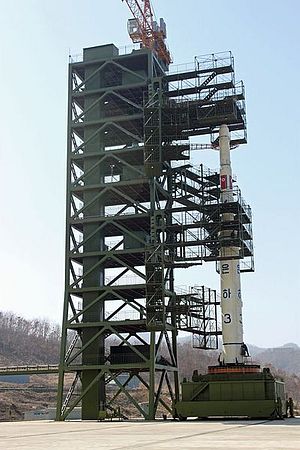There has been a persistent effort on the part of Iran hawks and other more careful observers to link North Korea and Iran together as part of a nuclear axis. This makes good sense from the part of Iran hawks, who want to hype the Iran threat and undermine diplomatic outreach to Tehran. Creating the impression that we can deduce Iran’s future behavior from North Korea’s actions serves both of those goals nicely.
As I’ve argued before, the linkage doesn’t make a great deal of sense. Iran and North Korea differ drastically in terms of their geography, culture and history as well as in the makeup of their current governments. The only common denominator is in their general adversarial status toward the United States. And by this barometer, one could argue that Cuba is likely to invade Florida simply because of Russia’s land grab in Crimea.
Another element of the North Korea-Iran nuclear axis question, however, is whether the countries are cooperating on nuclear matters (they have cooperated on ballistic missile technology). More specifically, it has often been suggested that Iran is receiving substantial nuclear assistance from North Korea. Some have gone so far as to argue that North Korea’s nuclear tests were really disguises for Iranian nuclear weapons test—in the same way that South Africa likely allowed Israel to test nuclear weapons on its territory—or at the very least that Iranian nuclear scientists were present at Pyongyang’s nuclear tests.
These arguments are more technical in nature, which makes them easier to believe for the vast majority of people who have no rudimentary knowledge about nuclear weapons programs. However, they actually make even less sense than arguments about deducing Iran’s future nuclear negotiating behavior from North Korea’s past diplomacy.
A new report from the Congressional Research Service (CRS) therefore does us all a great service in helping to debunk the Iran-North Korea nuclear axis myth. The report, which is based on unclassified and declassified U.S. intelligence as well as CRS’s conversations with members of the intelligence community, concludes: “No public evidence exists that Iran and North Korea have engaged in nuclear-related trade or cooperation with each other.”
Regarding all the hype surrounding ballistic missile and nuclear cooperation among Iran, North Korea, and Syria, the report points out: “Although such unofficial sources allege a fairly significant and persistent level of cooperation among these three countries on their ballistic missile and nuclear programs, such reports lack the credibility of official assessments because they are often unsourced or attributed to anonymous government officials, frequently at odds with each other, and unverifiable [emphasis added].”
Later, the report notes that U.S. officials have repeatedly and unequivocally denied nuclear cooperation between Iran and North Korea, despite revealing that Pyongyang has assisted other countries like Syria with nuclear technology and that Iran and North Korea have cooperated extensively with ballistic missile technology. Thus, there is no obvious reason why the U.S. wouldn’t expose Iran and North Korean nuclear cooperation if it had evidence that it occurred (or is occurring).
And there’s good reason to think it’s not occurring. Namely, while North Korea’s nuclear program to date has largely been based on acquiring the necessary fissile material from reprocessed plutonium, Iran’s potential fissile material would come from enriching uranium. It doesn’t have a reprocessing facility or plans to build one. In fact, at this stage Iran doesn’t even have a heavy water reactor.
It’s only been in recent years that North Korea has begun concentrating more seriously on enriching uranium. However, at that point it would have had little to teach Iran about the technologies and processes involved in enriching uranium. Moreover, their uranium enrichment programs are derived from different centrifuges, which further limits cooperation. Since North Korea’s nuclear tests are believed to have been of plutonium-based devices, this precludes the possibility that they were secretly Iranian nuclear weapons tests. While it’s possible that Iranian scientists were present for these tests, it’s unclear exactly how this would benefit Iran’s nuclear efforts. As the CRS report puts it:
“The extent to which Iran and North Korea could benefit from nuclear-related cooperation is uncertain. Although some analysts have argued that Pyongyang could provide nuclear test data to Tehran, the extent to which Iran could benefit from such data is unclear. North Korea’s nuclear weapons program to date has apparently been based on plutonium; Iran would most likely use weapons-grade HEU, rather than plutonium, as fissile material in nuclear weapons, at least in the short term. Although Tehran could provide Pyongyang with access to Iran’s enrichment technology, such access would be of limited benefit to North Korea because North Korea’s centrifuge appears to differ from the two types of centrifuges that Iran has installed.”
More interestingly, the report points out that North Korea and Iran might be fierce competitors in the nuclear realm. As CRS explains:
“It is also possible that, rather than collaborating, the two countries may be competing with each other in their efforts to circumvent international sanctions by obtaining dual-use technologies from the same supply networks, particularly via trading companies in China … The two countries may be reluctant to export components to one another that they themselves have difficulty procuring. Moreover, involved Chinese trading companies would have a financial interest in maintaining business with both Iran and North Korea.”

































